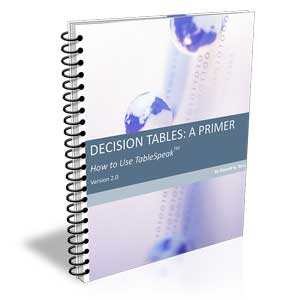Concept Models: Definitions, Terms, and Wordings
Extracted from Business Knowledge Blueprints: Enabling Your Data to Speak the Language of the Business, by Ronald G. Ross, 2020.
http://brsolutions.com/business-knowledge-blueprints.html
Central to business knowledge blueprints is a complete set of business-friendly definitions. A concept can never be intuitively obvious. How would you know? It's only in your mind. It needs a definition to reveal itself.
Practitioners with software intent or backgrounds may tell you that focusing on business definitions inevitably results in endless, unproductive debate. In our experience that's false (but yes, definitions can take some time to shape properly). Remember, computer code has traditionally been able to run without understanding terms.
Businesses can't, at least not nearly as well as they should. So, don't let software projects rush you past business definitions! The challenge is not just about getting software code running; it's about removing business risks and enabling the business to work properly. That puts a high premium on knowing how to craft great definitions.
Business knowledge blueprints define concepts, not words. Why? A word can have many meanings; a concept one and only one — actually, a concept is a meaning. That fact makes concept models unlike natural language dictionaries, which define words. It's an important point to remember.
But you can stick with common dictionary practices for defining terms — they're a good fit for business needs. By 'dictionary' I mean natural language dictionaries of course — not any kind of dictionary arising from IT. If you're creating a business knowledge blueprint, never say data dictionary. It simply doesn't compute! The focus is on business communication, not defining data per se.
Definitions of business concepts should be kept completely free of any data or IT biases. Such biases bedevil shared understanding and effective business communication. Concept models are oriented to what real business people mean when talking directly about real business things.
Terms
Each of your concepts will need a short handle so you can reference it easily and use it in sentences. So, each noun concept must be given a precise, business-friendly term. For example, the term for transportation machines that can travel on roads might be vehicle. Naming things well is an art in itself.
Be careful not to confuse concepts and terms. A term is not a concept per se; rather it is a designation of a concept. Remember, a concept stays in your mind; words merely act as the messenger between people (and perhaps intelligent machines).
For one concept, you can have many terms in the same or different natural languages (i.e., synonyms). A central goal for your vocabulary is that a term should never represent more than one concept. Otherwise, you'll have ambiguity — specifically homonyms. For example, net shouldn't be used loosely to mean any of: internet, hairnet, and dragnet!
Wordings
Verbs and verb phrases express concepts too. Just as a term represents a noun concept, a verb symbol represents a verb concept. Suppose a person rents a vehicle. Rents has a particular meaning in connecting person and vehicle. Careful delineation of verbs and verb phrases for verb concepts is a distinguishing feature of concept models.
To use verb concepts in a natural language such as English, they must be expressed properly under the grammatical rules of that language. So instead of verb symbol, we say wording. Here is an example of a wording: person rents vehicle. Rather than true designations, wordings are syntactical structures you can use to actually form sentences.
Why should you be interested in verb concepts and wordings? Very simple. Textual knowledge is expressed in sentences, sentences are comprised of clauses, and each clause requires a verb. Effective, unambiguous communication, especially with people you don't talk with face-to-face, requires them.
# # #
About our Contributor:
Online Interactive Training Series
In response to a great many requests, Business Rule Solutions now offers at-a-distance learning options. No travel, no backlogs, no hassles. Same great instructors, but with schedules, content and pricing designed to meet the special needs of busy professionals.










How to Define Business Terms in Plain English: A Primer
How to Use DecisionSpeak™ and Question Charts (Q-Charts™)
Decision Tables - A Primer: How to Use TableSpeak™
Tabulation of Lists in RuleSpeak®: A Primer - Using "The Following" Clause
Business Agility Manifesto
Business Rules Manifesto
Business Motivation Model
Decision Vocabulary
[Download]
[Download]
Semantics of Business Vocabulary and Business Rules